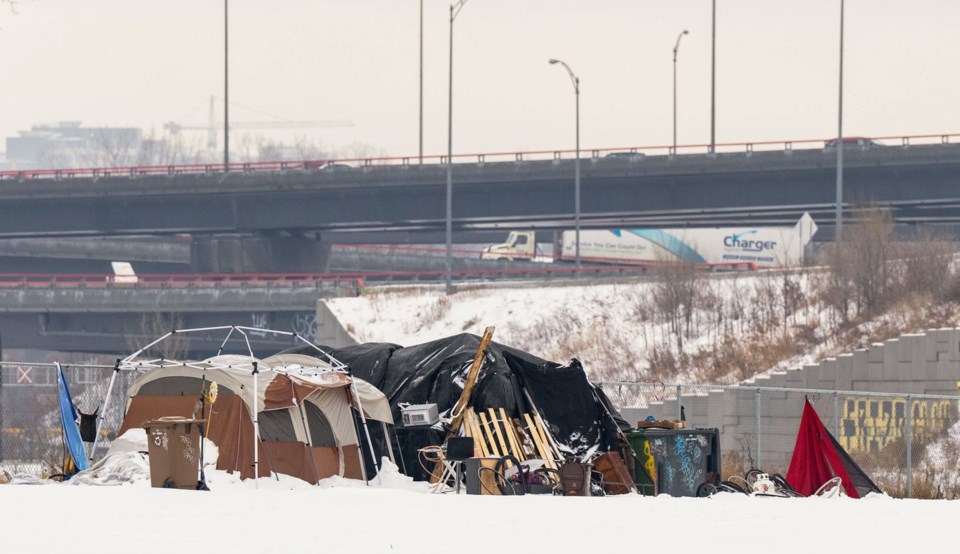MONTREAL — In Montreal, municipal politicians, health officials and community groups can't agree on what to do about homeless encampments, which are regularly dismantled by social workers and police.
As the city struggles with a rise in the number of people sleeping outside, especially since the COVID-19 pandemic, a new report by a committee that studied homelessness in Montreal says there is no consensus about whether encampments should be permitted on public property.
While some cities, like Halifax, have created designated locations where homeless people can pitch a tent, the City of Montreal has long maintained that encampments are not a safe or sustainable solution to homelessness — and that tents sometimes must be taken down for security reasons.
But the report released on Monday suggests that several members of the committee, composed of city officials and representatives from health, business, community and research groups, want the city to stop dismantling encampments and instead offer supports such as heated tents, sleeping bags as well as food and sanitation services.
"This question of the functioning in an encampment that would be accepted by authorities remains open; the opinions of members differ,” the report read.
Living in fear of a dismantlement creates “instability and psychological uncertainty” for people who sleep outdoors, and having to move frequently affects their health and "compromises their capacity to protect themselves against bad weather, temperature variations and extreme conditions,” the report said.
Support services could make people feel safer and develop routines and a sense of community that would beneficial, it added, reflecting some of the committee members' views.
However, some committee members also highlighted the risks of encampments, including isolation, violence, overdoses, crime, sexual exploitation and appropriation of public space. They also found that people in encampments would need a number of services, including for managing conflicts.
In response to Montreal's struggle with homelessness, municipal officials formed the committee last year. Its report comes as the city is also holding public consultations on how to better integrate homeless services into the neighbourhoods that surround them.
Sam Watts, the CEO of the Welcome Hall Mission, said cities and organizations are all grappling with how best to address the rise in homelessness and the growth in encampments.
He said some argue that since encampments exist, cities should build the infrastructure to support the people who live there. Watts said that while he doesn't believe it's helpful to "make vulnerable people more vulnerable by just simply knocking down tents and putting stuff in the garbage," he also feels encampments are unsafe.
"It's an attractive place for people with less-than-honourable motives," he said. "And so the notion that somehow these are wonderful little communities that can be nurtured and that we should support them, that is a misunderstanding of the reality of many of these encampments."
Instead, he believes governments and community groups need to redouble their efforts to prevent people from becoming homeless in the first place, as well as create more pathways to get people back to permanent housing.
"Let's just pause, take two steps backward and say, this is 2025, this is Canada," he said. "We can do better than this, and we must."
Montreal has continued to send social workers and police to dismantle encampments on a regular basis, including on a stretch of Notre-Dame Street last October. The city has indicated that it doesn't seek out encampments to dismantle them, but responds when they're reported in order to evaluate them for safety risks, including fires.
Montreal has also made a number of new housing announcements, including a pilot project for 60 modular housing units for the unhoused that is expected to launch this year.
According to the report, many of the people sleeping in Montreal's streets and parks have tried accessing emergency shelters but were unable, either because the spaces were full or because they didn't meet their needs. Many shelters present "structural barriers" to certain people through rules such as not accepting couples or pets, the report added.
James Hughes, the CEO of the Old Brewery Mission, believes there should be more support provided for people living in encampments, and that they should only be dismantled in "exceptional" cases of violence or serious criminal activity.
"Given the extreme lack of housing, the extreme lack of space in the emergency service network, letting them stay there is really the only option because just inviting them to leave means they're just going to go set up an encampment 100 metres from here or across the street and maybe in a less safe place," he said.
The report includes a number of recommendations, including creating year-round drop-in centres, protecting existing low-cost housing, and opening more shelter and transitional housing spaces that are better adapted to people's needs.
It also suggests developing a municipal protocol to outline how the city will intervene with unhoused people and evaluate the danger posed by encampments. The lack of an official protocol means situations are "left to interpretation, with unequal practices," according to experts in the field, the report said.
The report also noted that cities can't act alone to counter homelessness, and require the partnership of other levels of government.
Hughes believes the recommendations provide a road map that will help the city modernize its approach to homelessness, including the creation of rules that will allow people in encampments to remain where they are until a more permanent solution can be found for them.
This report by The Canadian Press was first published Jan. 20, 2025.
Morgan Lowrie, The Canadian Press



